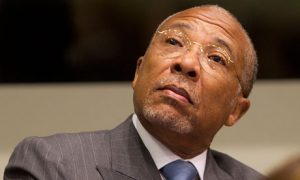By: Patrick Wheat
On May 31, 2012, the trial of former President Charles G. Taylor of Liberia came to a close in The Hague, Netherlands. After six years and over 115 witnesses called to give testimony, the International Criminal Court sentenced Mr. Taylor to 50 years in prison for his role in organizing the brutal crimes committed against the people of Sierra Leone, including the use of child soldiers, acts of terrorism against civilians, and the enslavement of a population. The verdict is being hailed as a triumph of international law and is being seen as another step towards justice for all war criminals. However, the question asked by far too many is, “Why is this important?” or “Why should we care?” From a cursory glance at the charges and the evidence, many would assume that he deserves whatever sentence is handed down for any role in the events of the Sierra Leone Civil War. What makes this case significant is that Charles Taylor is the first former head of state convicted by an international tribunal since the Nuremburg Trails following World War II.
The International Criminal Court, or ICC, is a relatively young organization, established in 1998 by the Rome Statute of the International Criminal Court. The purpose of the ICC is to serve as a tribunal to prosecute individuals for various war crimes, including genocide and crimes against humanity. The ICC has been recognized by 120 nations and has been given the power to arrest individuals within those nations. As of June 2012, 32 countries have signed but not ratified the Rome Statute, which requires these states to refrain from acts against the treaty. However, 41 nations have refused to sign the treaty, placing themselves outside the jurisdiction of the Court.
Now, even with all of this fascinating information on the International Criminal Court, the question remains: “Why is this case important?” This case demonstrates for the first time an instance in which a former head of state was not only held accountable, but was imprisoned for war crimes committed both prior to and during his rule. As a result, this case can be used as a basis for leveling charges against all other heads of state within international courts of law, ranging from the ICC to the International Court of Justice, a court which acts to settle disputes between nations.
With humans rights violations captivating the public’s eye, as evidenced by the Kony 2012 campaign earlier this year and the large funding that UNICEF and similar organizations consistently receive, actions taken against individuals responsible for such crimes have become more severe, ranging anywhere from house arrest or deportation to a prolonged jail sentence. As the ICC stands as the only court aimed solely at the prosecution of human rights violators, it is the best equipped to use this verdict as justification and precedent to further investigates war crimes around the globe.
The outcome of the Taylor case has had immediate impact on the ongoing trials of Laurent Gbagbo, former President of the Cote d’Ivorie, and Jean-Pierre Bemba, the former Vice-President of the Democratic Republic of the Congo, both of whom are currently on trial by the ICC for war crimes and crimes against humanity. In the long term, it is possible that the sentencing of Charles Taylor will be used as a model against which other leaders who have either allowed or committed crimes against humanity to occur under their leadership will be judged. An example of a leader who could be held accountable as a result of the Taylor case could be Bashar al-Assad of Syria, who has been criticized for, among other crimes, his handling of the Houla massacre, where 90 people were executed and a total of 108 were killed. If Al-Assad were brought up on charges as a result of the actions of his administration, the court would be able to use the precedent of the Taylor trial to pass judgment upon the Syrian leader.
The only issue going forward when considering what the sentencing of Charles Taylor might mean is the concern that even though the sentencing is significant, the ICC does not have enough political power or judicial jurisdiction to ‘hunt down’ criminals who commit these acts without the aid of its member nations. Several nations, including China and India, have refused to join the International Criminal Court, claiming that the ICC would impede on their ability to self-govern. Also, the United States has not signed onto the Rome Statue, claiming that the ICC needs to recognize more rights for their defendants, such as the right to a trial by a jury of your peers. However, the US did help to extradite Mr. Taylor to the ICC, showing willingness to support the mission of justice and for the punishment of war criminals, even if they are unwilling to give the court jurisdiction within their own boarders.
This watershed ruling has opened the doors to many new opportunities to allow international courts around the world to move forward with attempts to seek justice for war crimes. By ending the alleged immunity that heads of state had enjoyed until now, the international community is able to take another step towards ensuring that justice is brought fairly to all corners of the globe.

